Government College University, Lahore
The Government College University, Lahore (colloquially known as GCU) is a public research university located in Lahore, Pakistan.
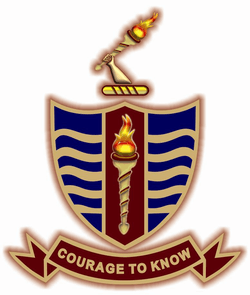 | |
Former names | Government College (GC) |
|---|---|
| Motto | Educating People for tomorrow (historical) Courage to Know (present) |
| Type | Public |
| Established | 1861 |
| Affiliation | Higher Education Commission (Pakistan) Pakistan Engineering Council Pakistan Bar Council National Computing Education Accreditation Council |
| Chancellor | Governor of the Punjab |
| Vice-Chancellor | Prof. Dr. Asghar Zaidi |
Academic staff | 434[1] |
Administrative staff | 96[1] |
| Students | 12,681[1] |
| Undergraduates | 5,831[1] |
| Postgraduates | 1,714[1] |
| 520[1] | |
| Location | , , |
| Campus | Urban |
| Colours | Royal Blue, goldenrod, maroon |
| Nickname | GCU |
| Website | gcu |
Established in 1861 as the Government College, it opened its doors in 1864.[2] After being elevated to a university status in 2002, it has advanced into one of the top ten largest institution in the Pakistan[3] with student body of over 12,000. GCU has 32 academic departments, segregated into five faculties. There are five research centers, focused on academic and industrial research and development projects. The university secured its second place in the general category by the Higher Education Commission (Pakistan) (HEC) in 2013.[4] It has the highest graduation rate in the country, with an average of 95.5% annually.[5][6]
GCU is noted for its historical roots and attracted notable scholars such as poet-philosopher Allama Muhammad Iqbal, Nobel laureates Har Gobind Khorana and Abdus Salam, former president of both the UN General Assembly and the International Court of Justice, Muhammad Zafarullah Khan, scholar and novelist duo of Bano Qudsia and Ashfaq Ahmed and many more to study and become alumnus of the institute.
History
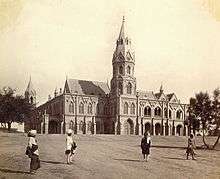
Originally, the establishment of a Central College in Lahore was sanctioned in 1856 by the British Raj, given that the teachers are from Oxford, Cambridge, Dublin or Durham. Government College was founded in 1861 when it was "briefly affiliated"[7] by Brahma University under the leadership of Gottlieb Wilhelm Leitner, professor of Arabic and Islamic Law at King's College London. It was not until 1 January 1864 that the college opened its doors in the Palace of Raja Dhyan Singh Haveli, inside Lahore's Walled City, where it was an affiliated college of Calcutta University.
In April 1871 the college moved to a large Bungalow near Anarkali. In 1873 its location was again changed to another house called Rahim Khan's Kothi, due to rapidly increasing student strength. At last in 1876, the college moved into its present building,
The first principal was Dr. G. W. Leitner, whose name is closely attached to the College. In 1882, Leitner was very instrumental in laying foundation of Punjab University. Thereafter, the college would remain affiliated with Punjab University for 115 years. In 1997, the Government of Punjab gave Government College autonomy in all affairs and granted degree awarding status.[2]
In 2002, it was promoted to university status by Government of the Punjab; the word college was retained in its title for preserving its historical roots.[8]
Campus
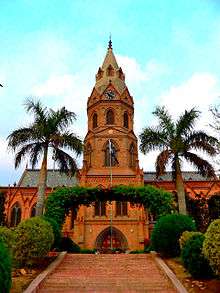
Old Campus
Positioned in downtown Lahore, GCU is located at the junction of The Mall and the Lower Mall, surrounded by main business and administrative areas, schools, colleges and Punjab University old Campus. The main building was designed by W. Purdon and completed in 1877 at a cost of Rs. 320,000. In the centre of the main building stands a 176' tall clock tower. Being built during the colonial era, the main building reflects the neo-Gothic tradition, with broad verandahs and elevated ceilings. A large ground accompanies the main building, alluded to as the "Oval Ground". On 24 August 2019, the ground was renamed to “The Leitner Oval”, in honor of Gottlieb Wilhelm Leitner, first Principal of GCU.[9] To meet with increasing number of students, several buildings/blocks have been commissioned, which include a Post-Graduate Block, New Block for Intermediate students and a Bachelors' Block, which is accessible by the overhead bridge.The main campus is erected on 56 acres, along the Anarkali Bazaar, one of the oldest surviving markets in Lahore.[10][11]
Emblem
The torch, as the crest of the university emblem, represents the light of knowledge. The motto "Courage to Know" represents the guiding principle of the student community.[13]
Academics
Programmes
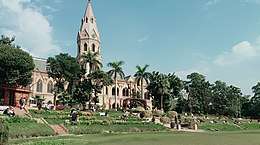
GCU offers degrees in Intermediate, Undergraduate and Post-graduate studies. Higher Secondary School Certificate (locally referred to as Intermediate) classes are available, but they don't have their own department. It also offers 28 Bachelor's Degrees,[14] 28 MS/M.Phil Degrees[15] and 19 P.hD Degrees.[16] These degrees are offered under the following faculties:
|
Institutes
The university has five autonomous/semi-autonomous, research-oriented institutes, focused on academic and industrial research and development projects. These institutes are
- Abdus Salam School of Mathematical Sciences (ASSMS) - study of scientific and technological problems by mathematical methods in mathematical sciences.
- Centre for Advanced Studies in Physics (CASP) - research and development (R&D) in Experimental Physics.
- Institute of Industrial Biotechnology (IIB) - offers degrees in Biotechnology and Microbiology.
- Sustainable Development Study Centre (SDSC) - R&D in Environmental Science.
- Centre of Excellence of China Studies (CECS) - offers diplomas in Chinese Language and China Studies.[17]
Research
GCU has always been a research-led university, however in recent times it has shifted its focus towards quality output projects, which the university believes to be beneficial academically and industrially. Office of Research, Innovation and Commercialization (ORIC) has been set up to manage all research issues. The objective of the ORIC is to advance, diversify, and manage all research programmes and to uphold international standards of research.
The university receives research grants mostly from the foreign universities like Strathclyde University, U.K., Cranfield University, UK, World Bank Research and British Council and from national institutes and organizations like PAEC, PSF, KRL, PTCL, HEC and Ministry of Science and Technology.[18]
Chairs
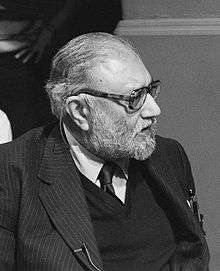
There exist nine departmental chairs at the university, each in honor of a professor apropos to the department and their accomplishments in the said discipline. The following chairs have been announced and will be put into effect in near future.
- Dr. Muhammad Ajmal Chair in Psychology
- Syed Ahmad Shah Patras Bokhari Chair in English
- Dr. Har Gobind Khorana Chair in Chemistry
The following six chairs have been established at the respective departments:
- Allama Iqbal Chair in Philosophy
- G.W. Leitner Chair in History
- Syed Ali Hajvery Chair in Persian
- Ashfaq Ahmed Chair in Urdu
- Sultan Ahmed Chair in Biological Sciences [19]
Abdus Salam Chair in Physics
The Abdus Salam Chair in Physics, named after the Pakistani theoretical physicist and Nobel laureate Abdus Salam, is an honorary chair in physics at the university. Starting out as a semi-autonomous institute, it became operational in March 2000 with the efforts of Ishfaq Ahmad, a lifelong friend of Salam. In 2009, the International Centre for Theoretical Physics (ICTP) donated Salam's original Nobel certificate to the Salam Chair in Physics. The former director of ICTP Dr. Katepalli R. Sreenivasan visited Lahore where he gifted the original Nobel certificate to the university's alma mater. The certificate reads: "for their contributions to the theory of the unified weak and electromagnetic interaction between elementary particles, including, inter-alia, the prediction of the weak neutral current".[20]
It has been integrated into Department of Physics, where M.Phil & P.hD students carry out their research work.[21] Some of its achievements include: getting 52 research publications in international journals;[22] producing 6 PhD and 25 M.Phil theses; the setting up of a Plasma Technology Lab; and contracting research grants from funding agencies and research centres such as the International Centre for Theoretical Physics (ICTP), Pakistan Atomic Energy Commission (PAEC), Kahuta Research Laboratories (KRL),[23] Pakistan Science Foundation (PSF)[24] and Pakistan Council of Scientific and Industrial Research (PCSIR).[22]
Dr. Rafi Muhammad Chaudhry Chair in Experimental Physics
The Rafi Muhammad Chaudhry Chair in Experimental Physics was named after R. M. Chaudhry, a renowned Pakistani nuclear physicist and a professor of particle physics at the university. He is widely regarded as having been the pioneer of experimental nuclear physics research in Pakistan.[25] During his tenure as professor at the university, he set up High Tension Laboratory there in 1952 (now amalgamated into Centre for Advanced Studies in Physics CASP) where research anent to gaseous discharges, ion and electron impact phenomena, nuclear physics, radioactivity and cosmic rays is carried out.
The university set up the chair in recognition of his services to Pakistan, and to Physics. Currently, post-graduate research work in Applied Physics is carried out here.[26]
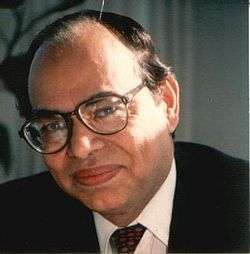
Mahboob-ul-Haq Chair in Economics
The Mahboob-ul-Haq Chair in Economics is the latest addition to honorary chairs at the university, named after Mahboob ul Haq, a Pakistani economist, politician and international development theorist who served as the 13th Finance Minister of Pakistan.[28] While serving as the Special Advisor to the United Nations Development Programme (UNDP), he led the establishment of the Human Development Report and the widely respected HDI.[29] The Economist called him "one of the visionaries of international development."[30]
The university established the chair to recognize his services to Pakistan, its people and above all to the discipline of Economics.[31] Apart from post-graduate research in Economics, the chair is also in charge of publishing GCU Economics Journal, an annual scholarly and peer-audited publication. It's intent is to act as a platform for researchers, professionals and students to share their achievements, their perspectives, and practical experiences.[32]
Abdus Salam School for Mathematical Sciences (AS-SMS)
The Abdus Salam School of Mathematical Sciences (AS-SMS) is one of the largest mathematical research institutes in Pakistan.[33] The school was established in 2003 by the Government of Punjab under the aegis of Government College University.[34]
The aim of the school is to train professional scientists to pursue the study of scientific and technological problems by mathematical methods and to undertake research in branches of mathematical sciences. Before the existence of ASSMS, Pakistani mathematicians opted to study abroad for postdoctoral fellowships, however an increasing number of PhD holders from foreign institutions are choosing ASSMS to pursue their postdoctoral fellowships.[33]
At 2011, ASSMS was labeled as the first "Emerging Regional Centre of Excellence" by the European Mathematical Society.[35]
ASSMS has taken steps to provide encouragement to Pakistani students in schools and colleges. These include:
- The faculty at the Abdus Salam School of Mathematical Sciences host training camps for students from schools and colleges. The participants of the camps are prepared for the national team of Pakistan to compete at the International Mathematical Olympiad (IMO). In 2005, the national team of Pakistan took part for the first time in IMO. In 2007 Pakistan won the first medal at IMO and the first silver medal in 2012.
- ASSMS organizes mathematics contests at the national level.
Accommodation
The university has four hostels - three for boys and one for girls. lqbal Hostel (built in 1891) and Quaid-e-Azam Hostel (built in 1993) accommodate about 150 and 200 Intermediate students, respectively. The New Hostel (built in 1937) houses about 400 Degree students. Girls Hostel (built in 1975) accommodates about 50 girl students. A Faculty Mess has been built for visiting family members, faculty, and officers of the other universities. Lodging and messing facilities are available here.[36]
Notable alumni
Alumni of the institute are called Ravians which is derived word from the name of the student magazine "Ravi", published by the administration of the college; the magazine name is inspired by the Ravi River.[37]
 Sir Muhammad Iqbal - national poet of Pakistan and important figure in Urdu literature
Sir Muhammad Iqbal - national poet of Pakistan and important figure in Urdu literature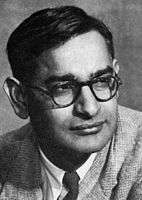 Har Gobind Khorana - won the 1968 Nobel Prize in Medicine
Har Gobind Khorana - won the 1968 Nobel Prize in Medicine Abdus Salam - won the 1979 Nobel prize in Physics
Abdus Salam - won the 1979 Nobel prize in Physics Muhammad Zafarullah Khan - former president of both the UN General Assembly and the International Court of Justice
Muhammad Zafarullah Khan - former president of both the UN General Assembly and the International Court of Justice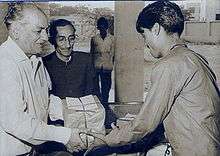
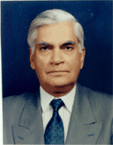 Ishfaq Ahmad - a Pakistani nuclear physicist who served at CERN and the International Atomic Energy Agency.
Ishfaq Ahmad - a Pakistani nuclear physicist who served at CERN and the International Atomic Energy Agency.
- Ashfaq Ahmed - an intellectual, playwright and broadcaster, awarded the President's Pride of Performance and Sitara-i-Imtiaz for his services in the field of literature.
- Syed Ahmed Shah - known by his pen-name Patras Bokhari; served as the first Permanent Representative of Pakistan to the United Nations.
- Sufi Ghulam Mustafa Tabassum - 20th-century poet, best known for his many poems written for children, and as the translator of many poetical works from Persian into Punjabi and Urdu.
- Prof. Dr. Saadat Saeed - a professor of Urdu language and literature at the university and contemporary critic and poet of Urdu language.
- Ishfaq Ahmad - an IEEE fellow, recognized for his contributions to scheduling techniques in parallel and distributed computing systems and video coding.
- Senior Justice Javed Iqbal - son of Dr. Muhammad Iqbal; had a prolific career in the Judiciary of Pakistan.
- Amjad Siddique - a Pakistani former first-class cricketer who played for WAPDA cricket team, including some time as captain.
- Rameez Raja - a Pakistani cricketer, who represented Pakistan in 1990s. He is a well-known commentator in international cricket matches.
Gallery
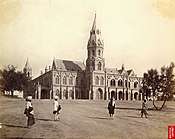 Government College circa 1880, as seen from Oval Ground.
Government College circa 1880, as seen from Oval Ground.- GCU, as seen from outside.
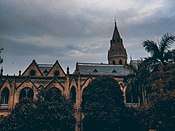 GCU's tower.
GCU's tower.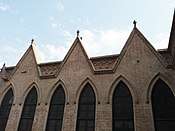 British style architecture of GCU.
British style architecture of GCU.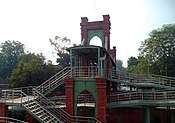 GCU's overhead bridge, connecting Main Building with Bachelors' Block.
GCU's overhead bridge, connecting Main Building with Bachelors' Block. old building of languages
old building of languages GCU courtyard.
GCU courtyard.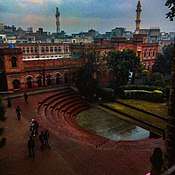 GCU's amphitheater after rain.
GCU's amphitheater after rain.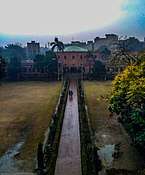 Overview to Bokhari Auditorium, GCU's general auditorium, named after Potras Bokhari.
Overview to Bokhari Auditorium, GCU's general auditorium, named after Potras Bokhari.- GCU's Tower Door, representing English church architecture.
References
- "About GCU". Government College University, Lahore. Retrieved 18 August 2012.
- "College to University". gcu.edu.pk. Retrieved 16 September 2019.
- "GCU now ranks at #6 among the top nine universities of Pakistan". Daily Times. 28 September 2018. Retrieved 16 September 2019.
- "HEC rankings". Higher Education Commission, Pakistan. Archived from the original on 25 May 2013. Retrieved 20 November 2012.
- "Graduation at GCU". Graduation at GCU. Retrieved 9 September 2013.
- "GCU among top 10 universities of Pakistan". www.thenews.com.pk. Retrieved 17 September 2019.
- "Delhi and Punjab: essays in history and historiography" (1995) N.Singh https://books.google.com/books?id=TyluAAAAMAAJ
- "The Government College University, Lahore Ordinance, 2002". www.gcu.edu.pk. Retrieved 18 September 2019.
- "GCU Oval ground named after Dr Leitner". www.thenews.com.pk. Retrieved 18 September 2019.
- "Historical Background". gcu.edu.pk. Retrieved 18 September 2019.
- "The Main Campus". gcu.edu.pk. Retrieved 18 September 2019.
- "GCU KSK Campus". www.gcu.edu.pk. Retrieved 14 September 2019.
- "GCU Emblem". www.gcu.edu.pk. Retrieved 15 September 2019.
- "Faculty-wise Majors for Bachelors". gcu.edu.pk. Retrieved 19 September 2019.
- "MS/MPhil Programmes". www.gcu.edu.pk. Retrieved 18 September 2019.
- "PhD Programmes". www.gcu.edu.pk. Retrieved 18 September 2019.
- "GCU Academic Departments". www.gcu.edu.pk. Retrieved 15 September 2019.
- "Research Work". www.gcu.edu.pk. Retrieved 18 September 2019.
- "Chairs, GCU". www.gcu.edu.pk. Retrieved 19 September 2019.
- GCU houses Dr. Abdus Salam’s Nobel prize Archived 22 October 2012 at the Wayback Machine
- "Facilities, Dept. of Physics". www.gcu.edu.pk. Retrieved 19 September 2019.
- "Archived copy". Archived from the original on 4 March 2016. Retrieved 11 January 2017.CS1 maint: archived copy as title (link)
- "Research Fellowships Awarded". Government College University, Lahore. Archived from the original on 4 March 2016. Retrieved 2 October 2012.
- "Research Grants Awarded". Government College University, Lahore. Archived from the original on 4 March 2016. Retrieved 2 October 2012.
- Haq, Prof. M. Ikramul (17 January 2004). "Remembering Dr Rafi Chaudhry". Dawn newspaper. Retrieved 2009. Check date values in:
|accessdate=(help) - "Dr. Rafi Muhammad Chaudhry Chair in Experimental Physics". www.gcu.edu.pk. Retrieved 19 September 2019.
- https://www.britannica.com/biography/Mahbub-ul-Haq
- Mahbub ul Haq, a heretic among economists, died on 16 July, aged 64
- https://web.archive.org/web/20131104100358/http://hdr.undp.org/en/humandev/reports/
- "Mahbub ul Haq". The Economist. ISSN 0013-0613. Retrieved 23 February 2016.
- "Mahboob-ul-Haq Chair in Economics". www.gcu.edu.pk. Retrieved 19 September 2019.
- "Publications: GCU Economic Journal". www.gcu.edu.pk. Retrieved 19 September 2019.
- "A Report on ASSMS" (PDF). Abdus Salam School of Mathematical Sciences, Lahore. Archived from the original (PDF) on 4 May 2015. Retrieved 17 August 2015.
- "About the Abdus Salam School of Mathematical Sciences". Government College University, Lahore. Archived from the original on 16 October 2012. Retrieved 18 August 2012.
- "Emerging Regional Centre of Excellence". European Mathematical Society. Archived from the original on 6 September 2015. Retrieved 18 August 2015.
- "Accommodation at GCU". www.gcu.edu.pk. Retrieved 18 September 2019.
- GCU. "Old Ravian Union". Old Ravian Union. Retrieved 9 September 2013.
External links
| Wikimedia Commons has media related to Government College University, Lahore. |